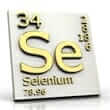Background
- Selenium is an essential trace mineral found in soil, water, and some foods. It is a component of the amino acids cysteine and methionine. Selenium is required for functioning of the body's antioxidant enzymes and for cell growth and survival.
- The presence of selenium in locally grown food and selenium levels in human populations reflects the selenium levels in local soil. The selenium content in food is influenced by geographical location, seasonal changes, protein content, and food processing. Periodic monitoring of selenium levels in soil and food is necessary. Selenium supplements may benefit people living in regions with very low environmental levels of selenium.
- Selenium has a strong protective action against the poisonous effects of many heavy metals, some toxic compounds, and fungal toxins.
- The role of selenium in cancer prevention has been the subject of recent study and debate. Initial evidence from the Nutritional Prevention of Cancer (NPC) trial suggested that selenium supplementation reduced the risk of prostate cancer among men with normal baseline PSA (prostate specific antigen) levels and low selenium blood levels. However, in this study, selenium did not reduce the risk of lung, colorectal, or basal cell carcinoma of the skin and actually increased the risk of squamous cell skin carcinoma.
References
- Arnaud J, Arnault N, Roussel AM, et al. Relationships between selenium, lipids, iron status and hormonal therapy in women of the SU.VI.M.AX cohort. J Trace Elem Med Biol 2007;21 Suppl 1:66-9. View Abstract
- Bardia A, Tleyjeh IM, Cerhan JR, et al. Efficacy of antioxidant supplementation in reducing primary cancer incidence and mortality: systematic review and meta-analysis. Mayo Clin Proc 2008;83(1):23-34. View Abstract
- Bjelakovic G, Nikolova D, Gluud L., et al. Antioxidant supplements for prevention of mortality in healthy participants and patients with various diseases. Cochrane Database Syst Rev 2008;(2):CD007176. View Abstract
- Duffield-Lillico AJ, Slate EH, Reid ME, et al. Selenium supplementation and secondary prevention of nonmelanoma skin cancer in a randomized trial. J Natl Cancer Inst 2003;95(19):1477-1481. View Abstract
- Etminan M, FitzGerald JM, Gleave M, et al. Intake of selenium in the prevention of prostate cancer: a systematic review and meta-analysis. Cancer Causes Control 2005;(9):1125-31. View Abstract
- Hurwitz BE, Klaus JR, Llabre MM, et al. Suppression of human immunodeficiency virus type 1 viral load with selenium supplementation: a randomized controlled trial. Arch Intern Med. 2007 Jan 22;167(2):148-54. View Abstract
- Lippman SM, Klein EA, Goodman, P. J., et al. Effect of selenium and vitamin E on risk of prostate cancer and other cancers: the Selenium and Vitamin E Cancer Prevention Trial (SELECT). 2009;301(1):39-51. View Abstract
- Rayman M, Thompson A, Warren-Perry M, et al. Impact of selenium on mood and quality of life: a randomized, controlled trial. Biol Psychiatry 2006;59(2):147-54. View Abstract
- Reid ME, Duffield-Lillico AJ, Slate E, et al. The nutritional prevention of cancer: 400 mcg per day selenium treatment. Nutr Cancer 2008;60(2):155-163. View Abstract
- Reid ME, Duffield-Lillico AJ, Sunga A, et al. Selenium supplementation and colorectal adenomas: an analysis of the nutritional prevention of cancer trial. Int J Cancer 2006 Apr 1;118(7):1777-81. View Abstract
- Shaheen SO, Newson RB, Rayman MP, et al. Randomised, double blind, placebo-controlled trial of selenium supplementation in adult asthma. Thorax 2007;62(6):483-90. View Abstract
- Stawicki SP, Lyons M, Aloupis M, et al. Current evidence from phase III clinical trials of selenium supplementation in critically Ill patients: why should we bother? Mini Rev Med Chem 2007;7(7):693-9. View Abstract
- Stranges S, Marshall JR, Natarajan R, et al. Effects of long-term selenium supplementation on the incidence of type 2 diabetes: a randomized trial. Ann Intern Med 2007;21;147(4):217-23. View Abstract
- Stranges S, Marshall JR, Trevisan M, et al. Effects of selenium supplementation on cardiovascular disease incidence and mortality: secondary analyses in a randomized clinical trial. Am J Epidemiol 2006;163(8):694-9. View Abstract
- You WC, Brown LM, Zhang L, et al. Randomized double-blind factorial trial of three treatments to reduce the prevalence of precancerous gastric lesions. J Natl Cancer Inst 2006;98(14):974-83. View Abstract







